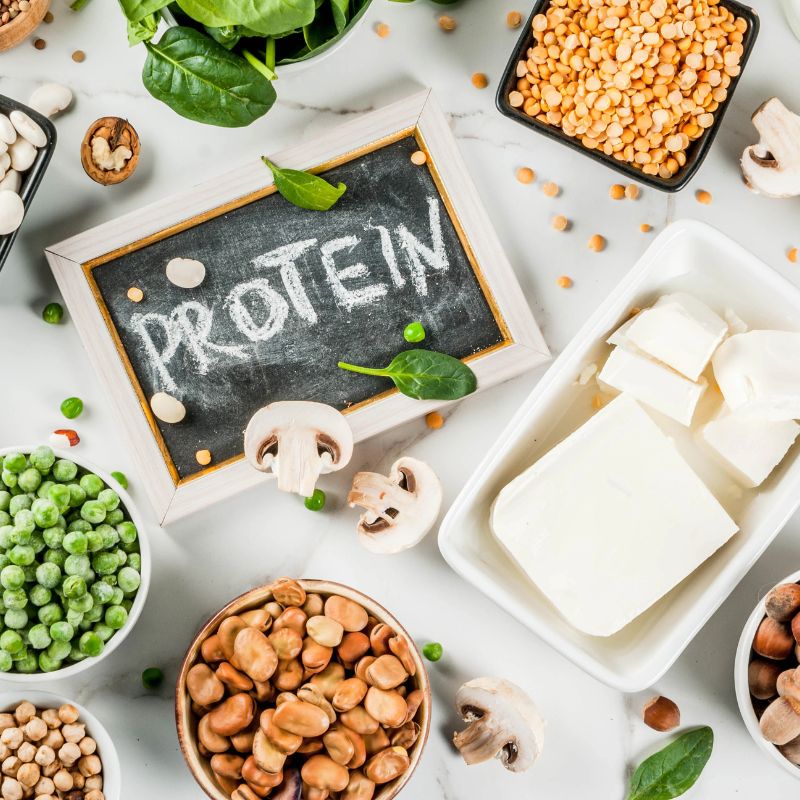As more people adopt vegan and plant-based lifestyles for health, ethical, or environmental reasons, one of the most common concerns is protein intake. Thankfully, the idea that you can’t get enough protein on a vegan diet is a myth. With the right approach, plant-based protein sources for vegans can provide all the essential amino acids needed to stay strong, energized, and healthy.
This guide will walk you through the most nutritious vegan protein options, how to combine them effectively, and tips to make your meals more balanced—naturally and deliciously.
Why Protein Matters in a Vegan Diet
Protein is essential for:
- Muscle repair and growth
- Hormone and enzyme production
- Immune system support
- Maintaining skin, hair, and nails
Contrary to popular belief, you don’t need animal products to meet your protein needs. There are plenty of plant-based protein sources for vegans that are complete, nutrient-dense, and versatile enough for everyday cooking.
Best Plant-Based Protein Sources for Vegans

Discover the top plant-based protein sources to fuel a healthy and balanced vegan lifestyle.
1. Legumes: Lentils, Chickpeas, Beans
Legumes are among the most powerful plant-based protein options. A single cup of cooked lentils provides about 18 grams of protein.
- Lentils: Rich in iron and fiber; cook quickly and blend well in soups or stews.
- Chickpeas (Garbanzo Beans): Perfect for hummus, salads, and curries.
- Black Beans/Kidney Beans: Great in tacos, bowls, and chili.
These foods are not just protein-rich but also high in fiber and low in fat.
2. Tofu, Tempeh, and Edamame
All made from soybeans, these are complete proteins—meaning they contain all nine essential amino acids.
- Tofu: Absorbs flavors well and can be grilled, sautéed, or scrambled.
- Tempeh: Fermented and nutty in taste; has more protein and fiber than tofu.
- Edamame: Young soybeans; perfect for snacks or stir-fries.
One cup of tempeh delivers about 30 grams of protein, making it one of the top plant-based protein sources for vegans.
3. Quinoa
Unlike most grains, quinoa is a complete protein, providing about 8 grams per cooked cup. It’s gluten-free, quick to cook, and works well in salads, bowls, and as a rice substitute.
It’s also a good source of magnesium, iron, and fiber—ideal for maintaining overall energy and digestive health.
4. Nuts and Seeds
Nuts and seeds are packed with protein and healthy fats.
- Almonds (6g per ounce)
- Chia Seeds (5g per 2 tbsp)
- Hemp Seeds (10g per 3 tbsp)
- Pumpkin Seeds (7g per ounce)
They also provide omega-3 fatty acids, which support brain and heart health—something vegans should be mindful of in a meat-free diet.
5. Whole Grains
Don’t underestimate grains like:
- Oats
- Brown rice
- Barley
- Amaranth
- Millet
While not always complete proteins on their own, when combined with legumes, they offer a full amino acid profile. A bowl of oats with nut butter and chia seeds can pack over 15 grams of protein.
6. Plant-Based Protein Powders
For convenience, vegan protein powders derived from peas, rice, hemp, or soy are effective supplements, especially for athletes or those with higher protein needs.
Look for clean-label products without added sugar or artificial flavors.
Combining Plant Proteins for Maximum Nutrition
It used to be thought that vegans had to combine certain foods (like beans and rice) at the same meal to get all essential amino acids. That’s been debunked. As long as your meals throughout the day are varied, your body will assemble the necessary proteins on its own.
Still, combining foods like legumes with grains or nuts can improve the bioavailability of nutrients and create more filling, satisfying meals.
Additional Tips for Boosting Vegan Protein Intake
- Snack smart: Keep roasted chickpeas, trail mix, or protein bars on hand.
- Plan your plate: Make sure every meal includes a protein source.
- Batch cook: Prepare quinoa, beans, and tofu ahead of time for easy meal assembly.
Eating a wide range of plant-based protein sources for vegans ensures not just protein adequacy but also a wealth of micronutrients that support your overall health.
FAQs About Plant-Based Protein Sources for Vegans
Q: Can I get enough protein from a vegan diet?
A: Yes! With proper planning and diverse food choices like legumes, soy, seeds, and whole grains, vegans can easily meet protein needs.
Q: Are plant proteins complete proteins?
A: Some are (like quinoa and soy), while others need to be combined. Eating a variety throughout the day ensures complete amino acid coverage.
Q: How much protein do vegans need daily?
A: Most adults need around 0.8g of protein per kg of body weight, though athletes may need more. Vegan sources can easily fulfill this with thoughtful meal planning.
Q: Is it necessary to use vegan protein powders?
A: Not required, but convenient—especially for athletes, those with limited time, or people transitioning to a vegan diet.
Q: What’s the healthiest plant-based protein source?
A: There’s no single best option, but legumes, soy products, quinoa, and seeds like chia and hemp offer excellent nutrition profiles.
Conclusion
Eating vegan doesn’t mean sacrificing your protein goals. In fact, there’s an abundance of rich, wholesome, and satisfying plant-based protein sources for vegans—from legumes and grains to seeds and superfoods. With a little meal planning, vegans can easily meet their daily protein needs while also enjoying diverse, flavorful meals.
Whether you’re a new vegan or a long-time plant-eater, understanding your protein options is key to staying healthy and energized. Choose a variety of sources, listen to your body, and enjoy the journey of nourishing yourself naturally.
For more wellness guides, plant-based nutrition tips, and expert resources, visit MindScribes—your digital partner for mindful and informed living.

